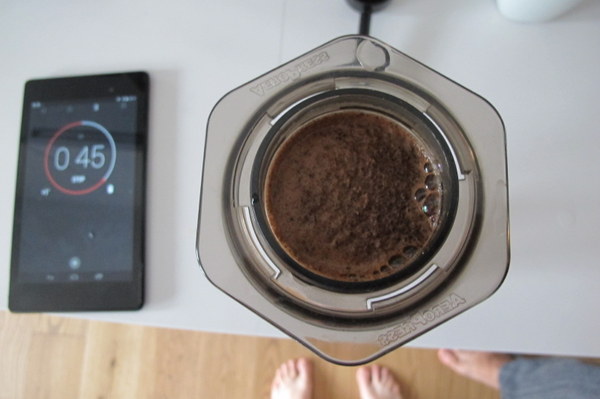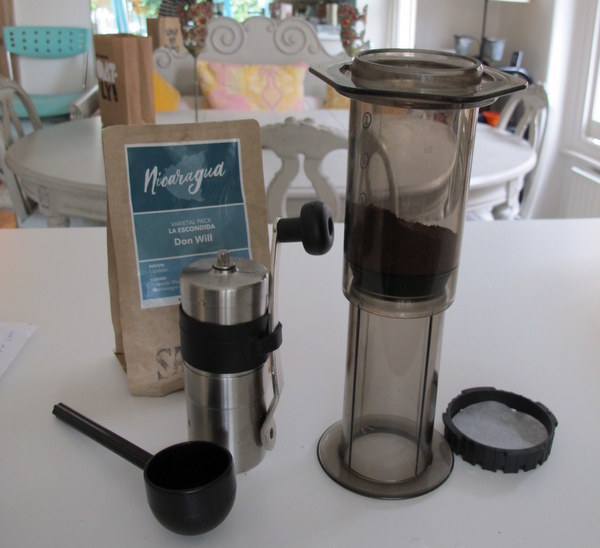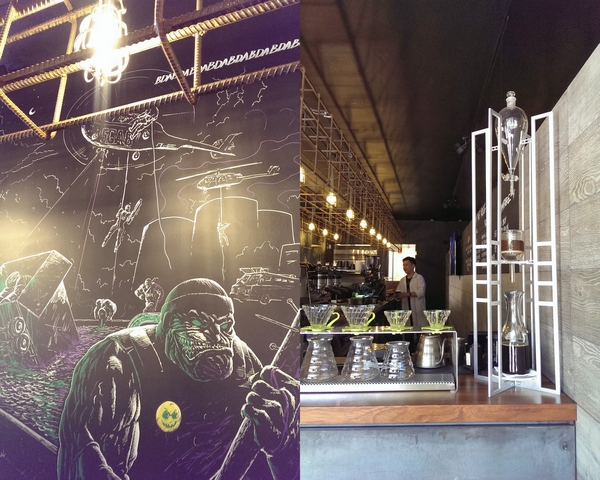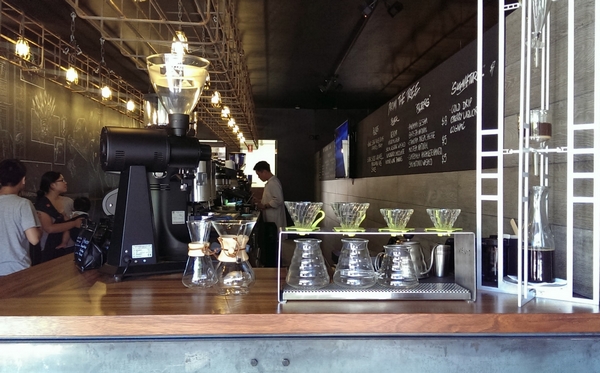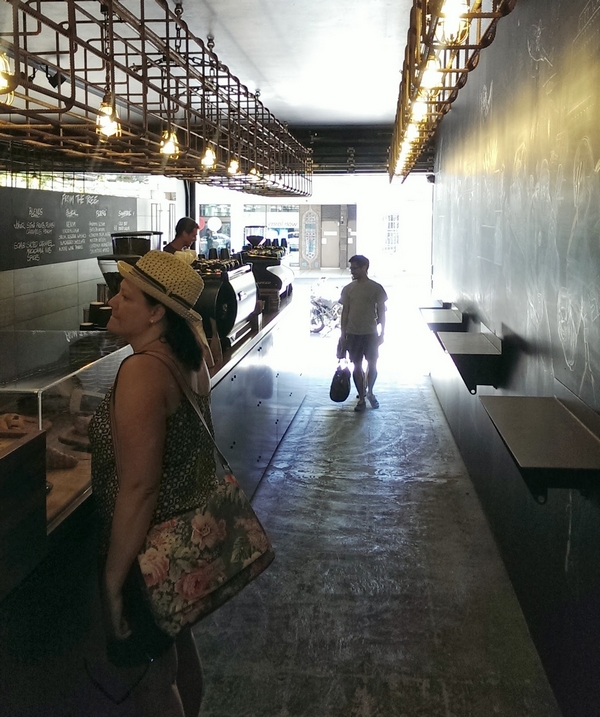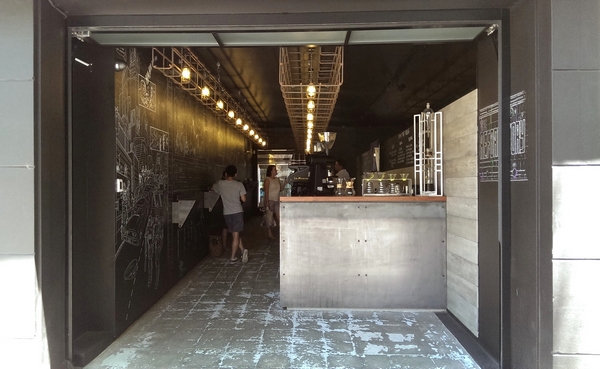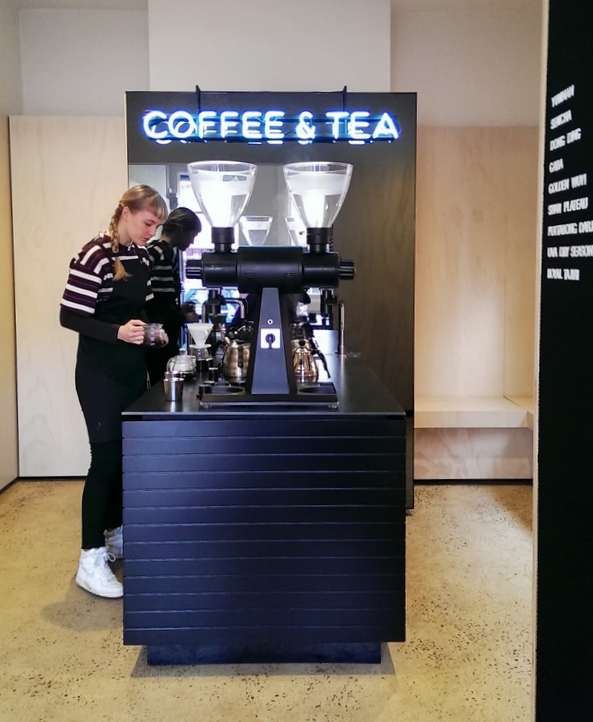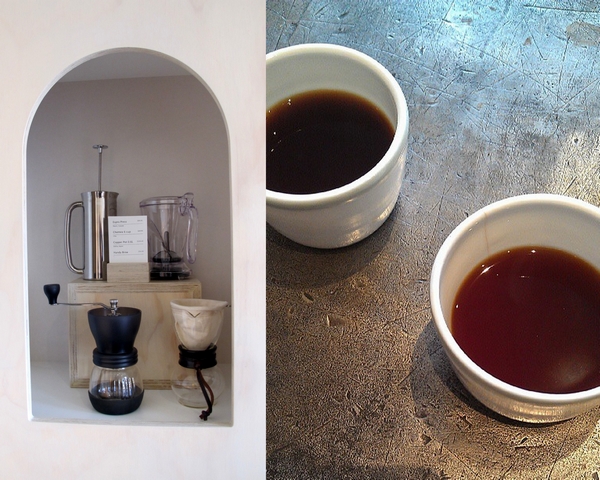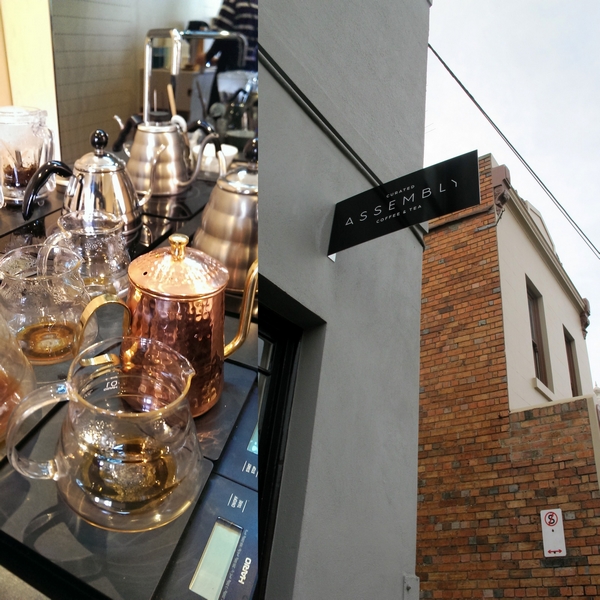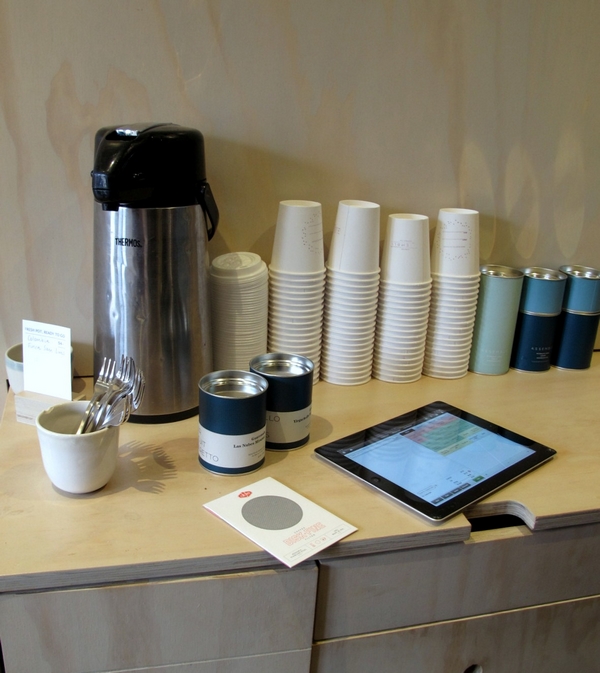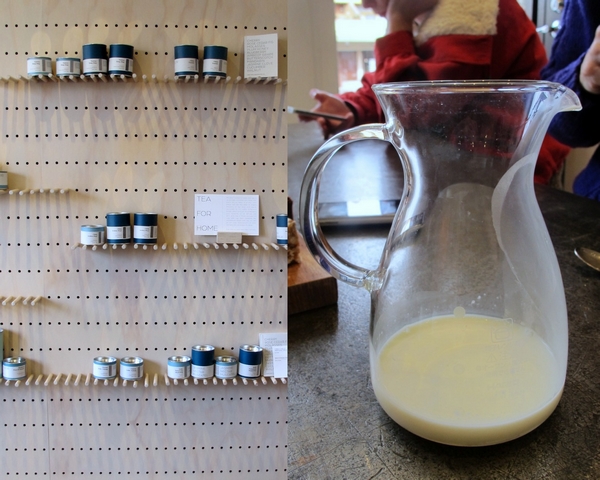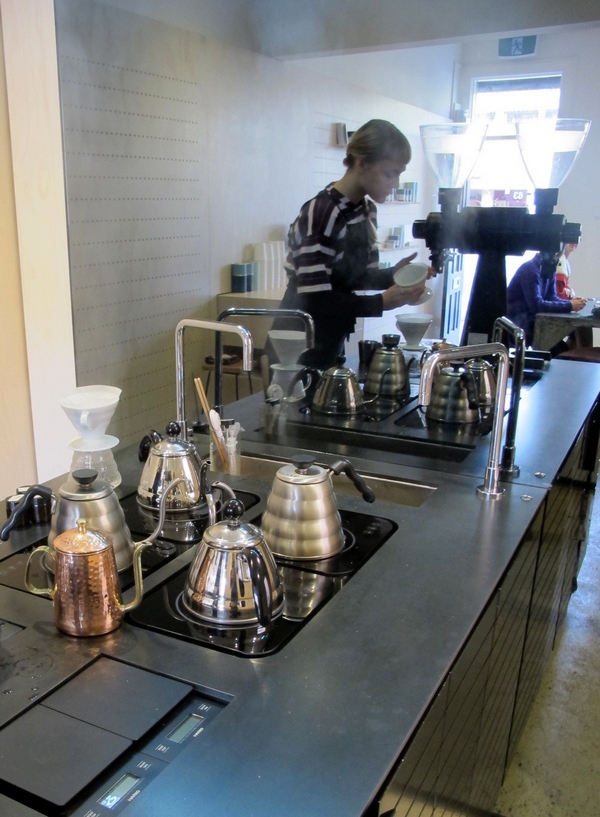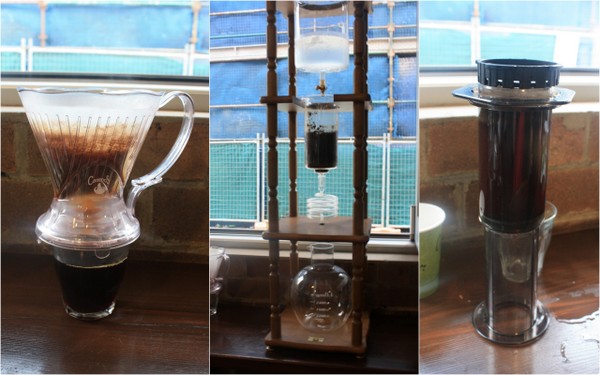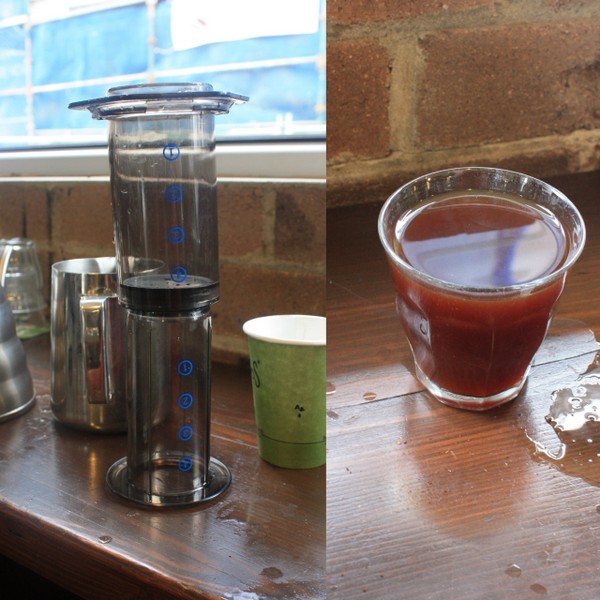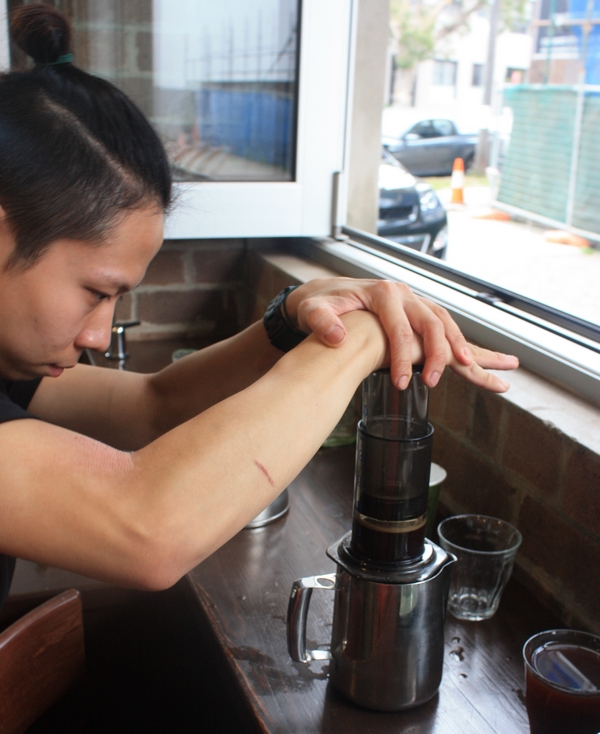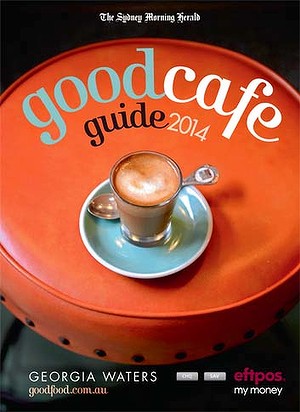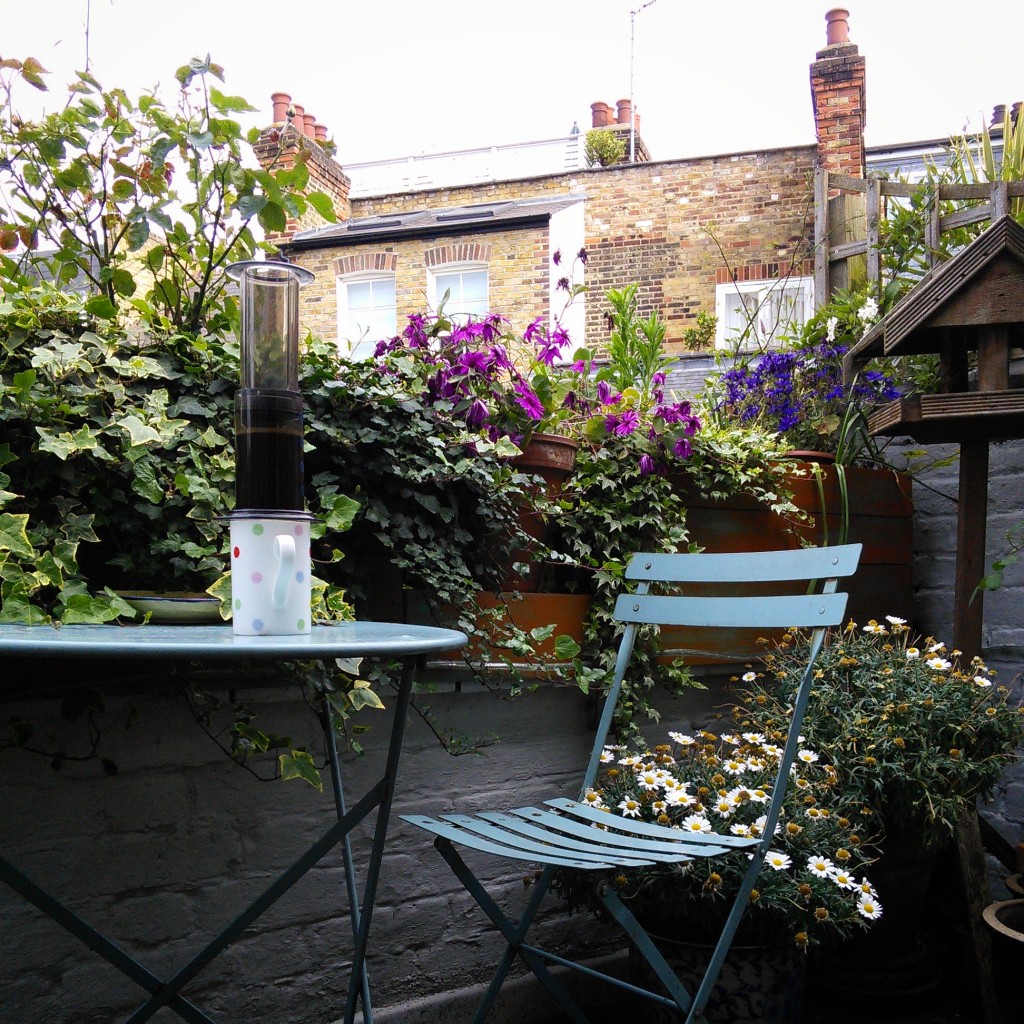
Make the aeropress your backup.
We coffee addicts, and even those of us who are coffee dabblers, usually have a go-to joint for our caffeine fix. But what of those particularly hectic workdays when you barely even have time to leave your desk? Or those rare and marvellous occasions when you find yourself travelling through unfamiliar lands, and you find that a good cup o’ joe is all too rare, and none too marvellous? In these situations, I put it to you that the consistent, tea-like gradual release caffeine buzz that is Aeropress is your best bet.
‘Third wave’ or filter coffee can often seem an overwhelming prospect, not only for its high-school-chemistry-looking gadgetry and need for precision, but also its almost dogmatic rejection of all things lactose-based (or adjacent). But it doesn’t have to be that way. In fact, in environments where a good coffee can be hard to find, it could be your salvation.
To become a competent (read: better than instant coffee or bad espresso) aerobrewster, you don’t need much, just:
A few abstract items:
• The ability to learn a new skill
• A willingness to drink black coffee
A few concrete items:
• Roasted coffee beans (as good quality as you can get your hands on)
• An aeropress
• The coffee scoop and filters that came with it
• A hand grinder (this one grinds well, is easy to use and tiny – it fits inside the aeropress itself)
• Your phone, if you can be bothered to time your brew
• A kettle, water
• A coffee mug
Nice-to-haves:
• Digital scales. Accomplished brewers consider these a must-have, if you already have some, use them, otherwise I think you’ll be ok.
What you do
1. First off, get everything together. Fill the kettle and set it to boil. You want boiled water that has cooled slightly (about 80 degrees).
2. Scoop in a scoopful of coffee and grind away until all the beans are ground. Set the aeropress up as above; the inversion method is the easiest. Pour in the ground coffee.
3. Dampen one circle of aeropress paper with a few drops of water and place it in the lid.
4. Set a timer for up to two minutes. Start the timer. Slowly pour in the boiled water over the course of about 20 seconds, trying to evenly coat all the coffee grounds you can. Agitate the aeropress slightly (either with a teaspoon or just twirl/shake it a touch) to make sure there are no pockets of dry grounds.
5. When there are only about 20 seconds left on the timer, screw the lid on the top aeropress and place a mug upside down on top.
6. Flip the entire thing, mug and aeropress over so the aeropress is on the top and the mug is on the bottom. Slowly press all the water through the aeropress until the time is up.
7. If you wait a few minutes, when you take the lid off the aeropress to clean it, you can push the wet coffee grounds out in one neat puck.
8. Savour your coffee as it cools and the flavours change.
Have you tried aeropress? Have you had good results?
If you like your coffee geeked-out with a side of cartoons, Reformatory’s mad professor vibe may just be for you. Owner and head roaster (and fourth generation coffee farmer) Simon Jaramillo is a man possessed when it comes to coffee, serving up all the brews you could ever need from first to third-wave to everything in between.
The cafe is stand-and-drink only, so no chairs, just a few benches attached to the comic-adorned walls. The focus here is on the coffee, but there’s also same cakey things and killer empanadas if you’re feeling peckish.
The guys here are a little intense and are bound ask you how you heard about the place; I just tell them Raff sent me. They deliver your coffee two ways; as you ordered it (espresso, syphon, however) and as ground beans, so you can get a good sniff of the pre-brewed, roasted and ground product. Between that, a glass of water, the serving board and whatever sweet treat you couldn’t resist, there’s no room left on your coffee drinking bench. Just go with it.
The Reformatory Caffeine Lab
Shop 7B, 17-51 Foveaux St
Surry Hills, NSW 2010
Monday – Friday: 6:30am – 4:00pm
Saturday: 8:00am – 2:00pm
For an espresso-free caffeine experience that’s more akin to a meditation than a coffee break, Melbourne’s Assembly may be just what the coffee guru ordered. A compact minimilist caffeine shrine in inner Carlton, Assembly is about all things coffee- all things, that is, except espresso.
We arrive on a blustery Saturday morning well and truly ready for a warming brew. Assembly is a small, whitewashed, wood-panelled and filled with light. At the front of the space sits a small communal table that seats 6, temptingly laden with cakes as if we’d arrived just in time for morning tea. I spy Matt Forbes doughnuts amongst the cookies and cakes, almost impossible to resist, and there are arch-shaped indented wall shelves stocked with one of each and every third-wave coffee gizmo I know of.
Assembly’s mission is to spread the word of non-espresso brews. To this end, they source, and beautifully repackage, a range of teas and coffees from the likes of Reuben Hills, Market Lane and Small Batch. They painstakingly prepare the brews in-store, but you can also purchase beans and relevant coffee geek paraphernalia to take with you.
We’re run through the flavour profiles of four different filter coffee options. There are also 9 teas on offer. We try are the Los Nubes Miramar from Guatemala, roasted by Market Lane and the Ethiopia Yirgacheffe Kochere roasted by Market Lane, both black, as well as the Candyman blend, served with milk and roasted by Small Batch Roasters. There’s also the Finca El Naranjo from Honduras. The coffees are brewed one at a time, but for those who don’t have time to wait, there’s a cannister of batch brewed coffee ready to go, so you can help yourself to a paper cup and be on your way.
My partner in crime and I taste the two black coffees, and, serendipidously, I prefer the Los Nubes Miramar, with its gorgeous flavour of stone and dried fruits and nutty undertones, and he prefers the Yirgacheffe Kochere’s citrus and berry tones. The two couldn’t be more different, and we buy 100 grams of each for some further aeropress experimentation.
What I love about this concept is the ability to purchase tiny lots of beans – as little as 100g or even 50g, which means you’re buying what you will use in its optimum state – a dose of coffee is about 15 grams, so 100g will get you about 6 filter cups. It also means you can try a bunch of different beans and see what flavours tickle your fancy.
I’m surprised to find that I like the small space, and appreciate the communal feeling of sitting at the only table in the house and chatting to your neighbour. Assembly also have an online store, and you can join their ‘Coffee Fellowship’, in other words, buy a coffee subscription, either for yourself or as a gift for someone super caffeine-mad. *Hint hint*
Assembly Curated Coffee & Tea
60 Pelham Street Carlton VIC 3053
Monday – Friday 7:00am – 6:00pm
Saturday – Sunday 10:00am – 5:00pm
Manual brewing, alternative brewing, whatever you want to call it, it’s time to give it a go. DIY brewing methods such as aeropress, cold brew, pourover, syphon and their more well-known cousins such as French press and stove top coffee form another frontier in the exploration of coffee flavour. What’s more, they’re portable, cheap and easy to learn.
embedded by Embedded Video
YouTube
Still not convinced? Then check out my Q&A with Campos’ resident black coffee fanatic David Ruslie above. He talks black coffee culture in Australia, who’s ahead in the Sydney vs. Melbourne black coffee game and why you should give a damn about hands-on coffee brewing.
Other Black Coffee Revolution Posts:
Aeropress
Cold Drip Coffee
In these posts, we look at black coffee – the contraptions, the methods, the how to’s and the why’s. David Ruslie, Campos’ resident black coffee obsessive, walks us through aeropress, cold drip and pourover. He says there’s a growing interest in black coffee, because, sans milk and sugar, it really allows you to explore the flavour profiles of the coffees themselves.
“Coffee appreciation…it’s catching up to wine appreciation. There’s a lot more tasting notes, say with wine you have 200 tasting notes. Well, with coffee, you have 800 tasting notes, it’s really incredible.” David says. Sure, the man or woman on the street doesn’t need to know all 800 to enjoy their ‘new brew’, but it’s handy, he says, to be able to identify which flavours you prefer. You may think you’re not a black coffee drinker, but maybe you just haven’t found the right bean or the right method.
This week David shows us the simplest and most portable of the black coffee methods, aeropress. There are two main ways David uses the aeropress: the ‘normal’ method and the inverted method. In both cases, he advises that you pre-wet the paper filter with a few drops of water beforehand. To be precise, it’s also worth having a digital scale on hand to weigh your coffee and water, but you can also do it by sight. And the reason the water is boiled at the very beginning is that we’re aiming for water temperature of 92-96 degrees. The video gives you a good idea of what the below instructions actually look like in practice. If you’re interested in buying an aeropress, follow this link.
What you need:
– An aeropress
– an aeropress paper filter
– a kettle
– a mug to drink out of
– ground coffee or coffee beans
– a hand grinder (optional)
– a digital scale (optional)
embedded by Embedded Video
YouTube
The Normal Method
1. Boil your kettle.
2. Dampen the paper filter, place it in the aeropress disc and fit the disc into the larger of the two tubes.
3. Place the aeropress, filter end down on your scales and ‘zero’ them. Grind and/or pour in coffee to the desired weight.
4. Place aeropress over a mug or jug, filter side down.
5. Zero your scales again. Pour in 200g of boiled water. Give it a stir. Steep for 45 seconds.
6. Stir once again and place the ‘plunger’ in the aeropress. Slowly push down until all coffee is in the cup (about 20 seconds).
The Inversion/Upside Down Method
1. Boil your kettle.
2. Push the ‘plunger’ into the aeropress tube and turn upside down so that the tube is on top and the plunger is on the bottom.
3. Place it on your digital scales and ‘zero’ them. Grind and/or pour in coffee to the desired weight into the tube.
4. Zero your scales again. Pour in 200g of boiled water. Do not stir. Dampen the paper filter, place it in the aeropress disc and place on top of the upside down aeropress. Steep for 1 minute and 30 seconds.
5. Stir the coffee to break the crust. Fit the disc into the top of the aeropress. Place a jug or mug upside down on it.
6. Flip the entire aeropress 100 degrees. Slowly push down until all coffee is in the cup or jug (about 20 seconds).
Other Black Coffee Revolution Posts:
Cold Drip Coffee
About me
 Sharing easy recipes, hunting down the best coffee. Honest accounts, nothing too serious. Read more...
Sharing easy recipes, hunting down the best coffee. Honest accounts, nothing too serious. Read more...Recent Posts
- Aerpress means no more shit #travelcoffee and #workcoffee
- Why I write and four ace bloggers who do it better
- The five best things I ate in London
- Shoreditch is awesome, airports are not
- I quit sugar? Do I bollocks.
- Cubao Street Food, Alexandria
- The Reformatory Caffeine Lab, Surry Hills
- Brewtown Newtown
- Stay caffeinated over Christmas
- Gumption by Coffee Alchemy, Sydney CBD
Popular posts this month…
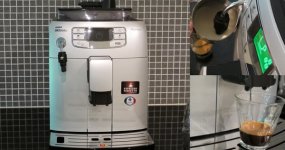 Review – Philips Saeco Intelia posted on January 10, 2012
Review – Philips Saeco Intelia posted on January 10, 2012  The quest for Mex part 2 – Feisty Chicken Burritos posted on December 21, 2010
The quest for Mex part 2 – Feisty Chicken Burritos posted on December 21, 2010  Sri Lankan Spinach with Coconut posted on December 10, 2010
Sri Lankan Spinach with Coconut posted on December 10, 2010  Lemonade Scones and family recipes posted on February 25, 2011
Lemonade Scones and family recipes posted on February 25, 2011  Café Review – Petty Cash Cafe, Marrickville posted on May 31, 2011
Café Review – Petty Cash Cafe, Marrickville posted on May 31, 2011 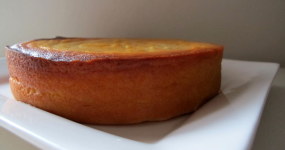 Kosher Whole Orange Cake posted on July 5, 2011
Kosher Whole Orange Cake posted on July 5, 2011  Sparkling Long Black posted on May 10, 2011
Sparkling Long Black posted on May 10, 2011  Salat Hatzilim posted on January 28, 2011
Salat Hatzilim posted on January 28, 2011
Disclaimer:
All opinions in this blog are mine, an everyday, real-life person. I do not accept payment for reviews and nor do I write sponsored posts. I do not endorse the content of the comments herein.

